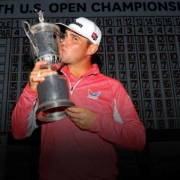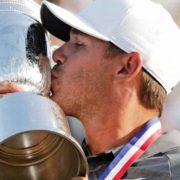Gary Woodland’s journey through heartbreak to U.S. Open champion
PEBBLE BEACH, Calif. — His son had just won the U.S. Open on Father’s Day, and Dan Woodland was standing near the 18th green talking about the day his heart stopped beating 10 years ago, when his boy Gary was a PGA Tour rookie trying to make the cut on this very course at Pebble Beach.
Dan Woodland had suffered a heart attack while playing golf, though he thought it was heartburn at the time.
“I had three bypasses,” he said Sunday night, “and then I coded.”
Coded?
“I passed,” Dan Woodland said. “Passed.”
Passed away?
“Yes,” he said.
Dan doesn’t remember much about that entire week in a Scottsdale, Arizona, hospital in 2009, other than the fact that he was gone and the doctors brought him back. “People ask me all the time, ‘Did you see any lights?'” Woodland said. “No. I didn’t even know it was happening.”
His wife, Linda, knew exactly what was happening. Gary and his sister, C.J., had spent time with their father after the heart attack, and before Gary left for the AT&T Pebble Beach Pro-Am. The triple-bypass surgery was thought to be a success. But two days later Dan suddenly lapsed into cardiac arrest.
“It happened right in front of me,” Linda said. “I screamed for a nurse. … They did a code blue in his room a couple of times over the intercom.”
Linda was rushed into a conference room.
“They carted him right past me,” she said. “There were all these doctors and nurses around him, you couldn’t even see him. They rushed him back into surgery.”
When the doctors reemerged, they told Linda that her husband had been gone three or four minutes before he was resuscitated for keeps.
“They ended up putting in a pacemaker defibrillator, and, ironically, last week the battery just went out,” Linda said. “It’s about a 10-year span, and now he’s scheduled to have that replaced in a couple of weeks.”
The mother of the U.S. Open champion laughed and motioned toward her husband, dressed in a Wilson cap and a dark sweatsuit as he beamed on the shores of the Pacific.
“Look,” Linda said. “He’s doing great now.”
How could Dan Woodland be doing any better? He had just watched his 35-year-old son win his first major championship by holding off Brooks Koepka, a chaser with Arnold Palmer’s arms and Jack Nicklaus’ taste for the biggest moments. On Sunday, in the final round of the U.S. Open, Woodland hit a remarkable 3-wood on the par-5 14th, and an even better chip shot on the green at the par-3 17th, to beat Koepka, a four-time major winner in his previous eight starts. Woodland then made a long birdie putt on the iconic final hole that inspired him to lift his putter toward the darkening sky before the ball dropped. That left him with a final score of 13-under, one stroke better than Tiger Woods’ 2000 score at Pebble in the most dominant performance the game has seen.
Having denied Koepka’s bid for an historic U.S. Open three-peat, Woodland walked off the course and into arms of the man who had coached him in youth baseball and basketball, but not in golf.
“He was hard on me,” Gary said. “He never let me win.”
Gary finally beat Dan in golf at age 13, and in hoops a year or two after that. Sunday night, sitting next to the national championship trophy, Gary described his old man, a longtime electrical contractor, as his best friend.
“I wouldn’t be where I am today without my dad, and the way he treated me, and the way he was hard on me,” Gary said. “And that’s something I look forward to doing with my son.”
Woodland’s son, Jaxson, turns 2 next week. Two years ago, Gary and his wife, Gabby, were expecting twins when they lost their daughter three months before Jaxson was born 10 weeks premature, weighing three pounds. Dan and Linda helped pull their son through that devastating event in the young couple’s life.
“It was his first child,” Linda said. “Just having a wife that’s pregnant and then losing one of [the children], it’s such a traumatic experience. He matured a lot through that. He was getting texts and emails from people all over the world — and that helped.”
After Woodland nailed down his third PGA Tour victory — in a playoff at the 2018 Waste Management Phoenix Open — he patted his heart, blew a kiss and pointed to the sky in honor of his lost girl. Gary had been there when Gabby delivered the daughter who never have a chance at life.
“That’s real,” he said after his Phoenix victory, “and I just wanted her to know I still love her.”
Gary said his wife suffered two miscarriages last year, and happily reported she is pregnant and due to deliver identical twin girls in August. Gabby was home Sunday with their healthy son while Gary introduced himself to the world as one of the toughest golfers alive.
As a high school basketball star in Topeka, Gary once tried to draw a charge on an opponent fixing to dunk on him. He took a knee to the chest that left him with a collapsed trachea and a trip out of the gym on a stretcher.
“The doctors said, ‘You’re not playing basketball for several weeks,'” Linda said of her son, who was injured on a Tuesday. “We were out of town, so we went to a doctor in Topeka and Gary said, ‘I’m playing Friday.’ And he did.”
A Division II basketball player at Washburn University, Woodland wouldn’t let a broken finger suffered in practice stop him from playing against his dream school, Kansas, in a preseason game in Allen Fieldhouse.
“He played with his fingers taped together,” Linda said. “He played through every injury ever. He never quits.”
As a young boy, Gary never wanted to quit swinging away with the lighter ladies clubs his parents bought him when he was 3 years old. Dan and Linda would take their son to a sports center in Topeka that had a driving range and a par-3 course.
“We would buy buckets and buckets of balls,” said Linda, who worked in banking for 46 years. “His little hands, they didn’t have gloves that small. His hands would bleed, and he still wanted to keep hitting balls.”
Before they could drag their child away, the sports center’s pro gave a lesson to Dan and Linda Woodland.
“Don’t let anybody touch him,” he said.
Don’t let anyone touch that swing.
Ultimately that swing proved natural enough to drive Gary away from his first love, basketball, and toward a spot on the golf team at Kansas, and then toward life as a pro. By any measure, Woodland was a PGA Tour success, a very good player struggling to find a bridge to greatness. He became best known as the golfer who guided Amy Bockerstette, a young golfer with Down syndrome, through an amazing practice-round par at TPC Scottsdale, a moment captured on a video that now has more than 5 million views. Gary and Amy were FaceTiming each other Sunday night, and for good reason.
Woodland entered the final round with an 0-for-7 record when holding at least a share of the lead after 54 holes. He knew this would be the most stressful round of his life, and yet his father noticed that his boy was as calm as he has ever been.
“I saw a different golfer this week,” Dan said.
The old man started feeling butterflies Friday night, and didn’t want to say much to Gary about what was unfolding at Pebble.
“It’s like a pitcher throwing a no-hitter,” Dan said.
Gary was doing just fine out there on his own. Dan noticed that his son was walking the course with his hands in his pockets; he’d never seen that before. The father figured Gary had come up with a new trick to slow himself down.
It worked. On the 72nd hole of the 119th U.S. Open, the fans chanted Gary’s name and gave shoutouts to Washburn basketball and Kansas golf. The slugger had proven he had the short game to ace the sport’s most demanding test. Woodland made that final putt to beat Tiger’s 2000 number, lifted his arms in touchdown form, and then wrapped his father in a bear hug.
During the trophy presentation on the green, Dan Woodland was asked if he’d thought about the fact that 10 years earlier, he nearly died while his son was trying to get his career going on the same course that now made him a U.S. Open champ.
“I really didn’t,” he said, before his eyes started to fill with tears on Father’s Day. Dan stopped for a few moments to gather himself.
“What I thought a lot about [on Sunday],” he said, his voice cracking, “was the one that was lost, Gary’s daughter.
“I know she’s up there saying, ‘That’s my father.'”



